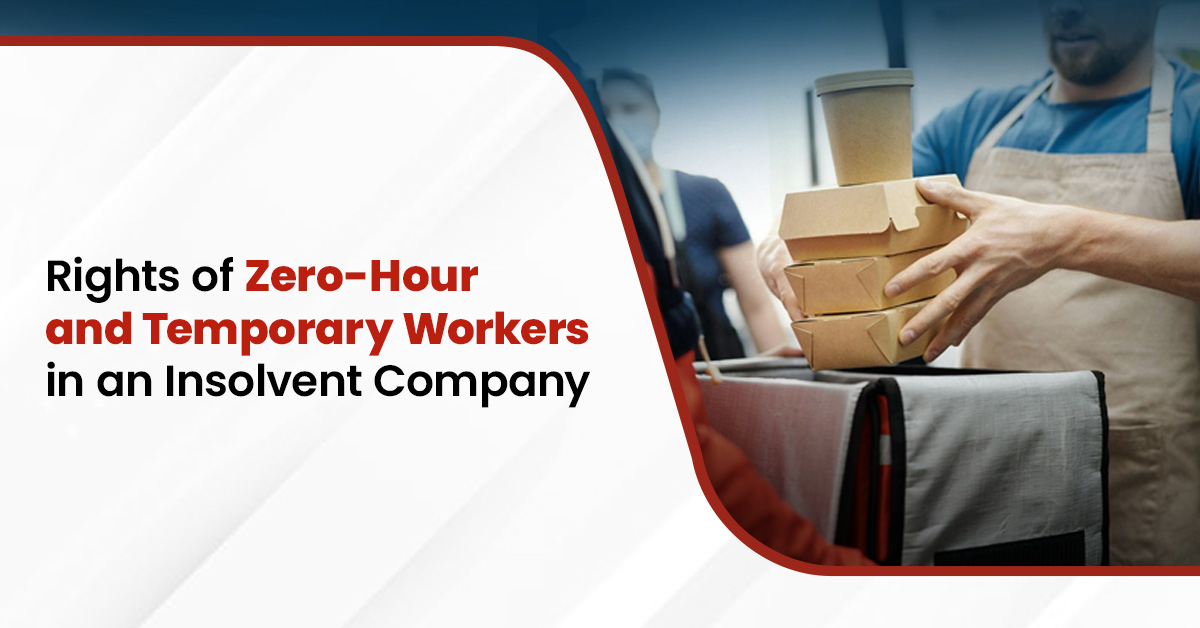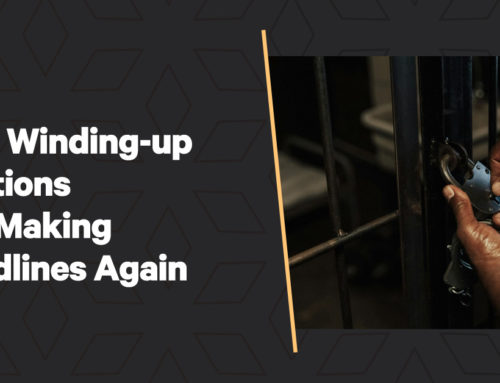Financial distress can put businesses under immense pressure, making it difficult to meet financial obligations. When insolvency strikes, the impact ripples far beyond creditors and shareholders – it affects employees, too. Zero-hour and temporary workers, often seen as less permanent staff, still have legal rights that protect them in these situations. For both workers and businesses facing insolvency, understanding these rights is crucial to ensuring fair treatment and confidently handling any challenges ahead.
In this blog, we’ll explore the rights of zero-hour and temporary workers in an insolvent company in the UK, focusing on key legal protections and what happens during the insolvency process.
Understanding zero-hour and temporary workers
Before we dive into the rights of these workers during insolvency, it’s important to clarify who zero-hour and temporary workers are:
- Zero-hour workers are employees who don’t have a guaranteed number of hours. They’re typically called in as needed, and while they may work irregular hours, they are still entitled to certain legal protections, including the national minimum wage and holiday pay.
- Temporary workers are usually hired for a set period or to fill specific short-term needs within a company. They may be employed through an agency or directly by the company, but they’re still considered employees with rights under UK employment law; including the right to a contract and protection from unfair treatment.
The insolvency process and employment rights
When a company goes into insolvency, whether it’s through administration, liquidation, or a Company Voluntary Arrangement (CVA), the rights of employees – both permanent and temporary – are safeguarded by UK employment law. However, there are certain nuances to be aware of regarding temporary workers in an insolvent company.
1. Job security during insolvency
One of the first concerns for zero-hour and temporary workers during insolvency is the security of their employment. As insolvency proceedings are initiated, the business will likely either reduce or cease operations, leaving employees uncertain about their future.
- Zero-hour workers may face an immediate cessation of work, as they’re not guaranteed hours. However, if the company is liquidated or enters administration, they have a right to be notified of the situation.
- Temporary workers may be laid off once the company enters insolvency, especially if their role was tied to a specific project or temporary need. However, they still have the right to be treated fairly and in line with any contract terms they have in place.
2. Pay and outstanding wages
In an insolvency scenario one of the primary concerns for temporary workers is whether they’ll be paid for work already completed. In the case of zero-hour and temporary workers, the priority is making sure that any unpaid wages are recovered.
- Outstanding wages: Employees, including temporary workers, are entitled to any wages owed up until the company enters insolvency. Temporary workers who are employed directly by the company can claim these wages as part of the insolvency process.
- Holiday pay: Zero-hour and temporary workers are entitled to holiday pay. If the company owes holiday pay and is insolvent, workers can claim this through the insolvency proceedings.
3. Redundancy rights
When an insolvent company goes into liquidation or administration, employees – including zero-hour and temporary workers – may be entitled to redundancy pay, depending on their length of service and contract terms.
- Zero-hour workers: If a zero-hour worker has been continuously employed for at least two years, they may be entitled to statutory redundancy pay. However, if their employment has been sporadic or under a fixed-term contract, they might not be eligible for redundancy pay.
- Temporary workers: If the temporary worker has been continuously employed for a specified period and is terminated due to insolvency, they may be entitled to redundancy payments. However, this right is contingent on the duration of employment and the nature of the temporary contract.
It’s important to note that redundancy payments are made by the Government Insolvency Service – not the insolvent employer – through the National Insurance Fund.
4. Employment contracts and notice periods
A key question for temporary workers in an insolvent company is whether or not they’re entitled to notice pay. In the event of redundancy or termination due to insolvency, the terms of the employment contract (if one exists) may dictate the required notice period.
- Zero-hour workers: The terms of a zero-hour contract usually don’t require a formal notice period unless otherwise stipulated. However, if a zero-hour worker has been employed for a long period or is employed on a fixed contract, they may have some contractual rights regarding notice pay.
- Temporary workers: Temporary workers on a fixed-term contract tend to have a clear notice period outlined in their contract. If their contract is terminated early due to insolvency, they may be entitled to notice pay or compensation for the remaining term of their contract.
5. Claiming entitlements in insolvency
In the event of insolvency, zero-hour and temporary workers aren’t left to fend for themselves when it comes to recovering unpaid wages or other entitlements. There are established processes in place to make sure they’re compensated fairly and promptly:
- Insolvency practitioner: An appointed insolvency practitioner (IP) will handle the company’s assets and liabilities. Employees can submit claims for unpaid wages, holiday pay, and redundancy to the IP.
- Employment tribunal: In some cases, employees may need to take their claims to an employment tribunal, particularly if they’re seeking compensation for unfair dismissal or other disputes relating to the insolvency process or unresolved entitlements.
How we can help
If you’re a temporary worker in an insolvent company or a business owner facing insolvency, it’s essential to understand your rights and responsibilities. Whether you’re an employer looking for advice on handling employee entitlements during insolvency or an employee seeking to recover unpaid wages or redundancy payments, our expert team at Leading Insolvency Practice is here to guide you. We offer tailored advice and practical solutions to help you navigate the complexities of the insolvency process. Call us on 0800 246 1845 or email us at mail@leading.uk.com to get expert advice and support through this challenging time.






